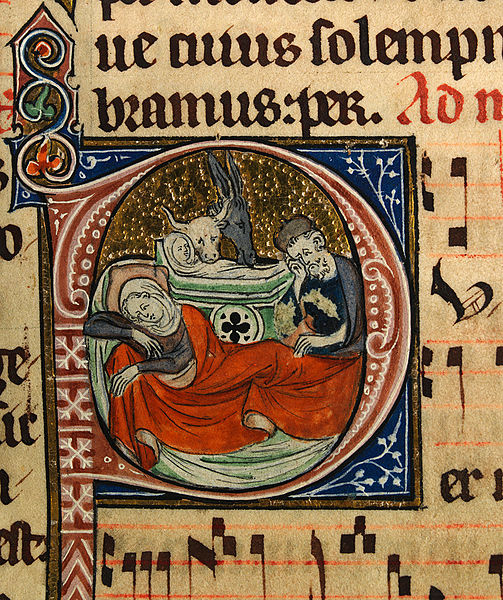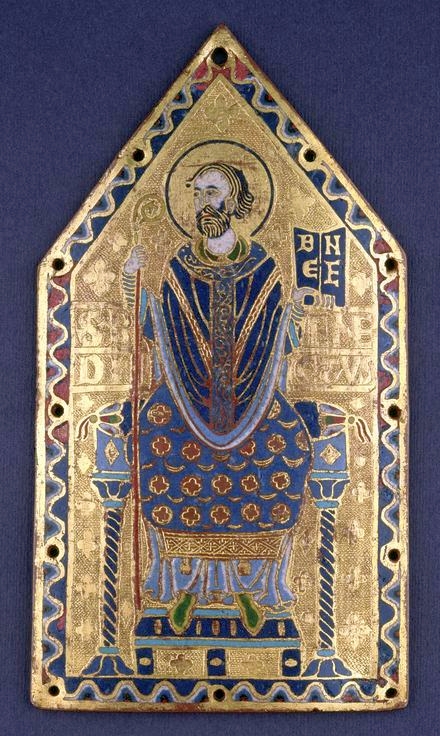Happy Christmas to all readers.
And by way of a Christmas present, detailed notes on the Office over the next week or so from the Ordo.
And if you would like to hear sung Matins of the Nativity, have a listen to monks of Notre Dame Priory, Australia.
The Ordo
Friday 24
December – Vigil of the Nativity, Class I
Matins: Two
Nocturns with invitatory antiphon, hymn, three readings and responsories,
chapter and collect of the Vigil, MB 85 ff and psalms of the day.
Lauds: Festal
psalms with antiphons, chapter, responsory, hymn, versicle, Benedictus antiphon and collect of the
Vigil, MD 54*/AM 232 ff.
Prime: Antiphon
1 of Lauds, MD 54*/AM 232.
Terce to None: Antiphon,
chapter, versicle and collect of the Vigil, MD 57-8*/AM 235.
END OF ADVENT/START OF THE SEASON OF CHRISTMAS (NATIVITYTIDE)
1 Vespers of the
Nativity of Our Lord: Psalms of Sunday with antiphons, chapter, responsory,
hymn, versicle, Magnificat antiphon
and collect of the feast, MD 58*/AM 236 ff.
Compline:
Marian antiphon Alma redemptoris,
versicle and collect for December 24 (Post
partum), MD 265-6/AM 174-5 henceforward.
The Office during Nativitytide
The season
of the Nativity lasts from 1 Vespers of Christmas Day until January 13, and
falls into four parts: the Vigil and feast of the Nativity; the Octave of the
Nativity; the days from January 2 to 5; and the season of Epiphanytide. The
texts for the Vigil and feast are proper to it.
Saturday 25 December – The Nativity of Our Lord, Class I with a
Class II Octave
Matins: Three
nocturns with invitatory, hymn, psalms, antiphons, twelve readings and
responsories all of the feast, LR 54 ff.
Lauds: Festal psalms
with chapter, responsory, hymn, versicle, Benedictus
antiphon and collect of the feast, MD 61*/AM 240 ff.
Prime: Psalms of
the day of the week; antiphon MD 64*/AM 244.
Terce to
None: Psalms of the day of the week; antiphon, chapter, versicle and
collect of the feast, MD 64-5*/AM 244-5.
2 Vespers of the Nativity:
Antiphons, psalms, chapter, responsory, hymn, versicle, Magnificat antiphon and collect of the feast, MD 65*/AM 245 ff.
[Le Barroux and some other monasteries: with a commemoration of St Stephen, MD
74-5*]
The Office during the Octave of the Nativity
During the
Octave, the psalms are either of the relevant feast, or of the day of the week
except at Vespers, which uses the psalms of the feast of the Nativity each day,
but with an alternating fourth psalm. The variable texts (antiphons,
chapters, versicle, collect, etc) are either of the feast (where there is one),
of the Sunday, or as for the feast of the Nativity.
Sunday 26
December – Sunday within the Octave of the Nativity, Class II;
Commemoration of St Stephen, Protomartyr
Matins: All as
for the Nativity except for the readings, responsories and collect.
Lauds: Festal
psalms; antiphons, responsory and hymn of the Nativity (AM 240 ff); chapter,
versicle, Benedictus antiphon and
collect of the Sunday within the Octave, MD 77* ff/AM 266; for the
commemoration, Benedictus antiphon, versicle and collect, MD 85*/AM 252.
Prime:
Antiphon 1 of Lauds, MD 77*/AM 240.
Terce to
None: Antiphon, chapter, versicle and collect of the Sunday in the
Octave, MD 81*/AM 266 ff.
2 Vespers: Antiphons,
psalms [4th psalm = Ps 129], responsory and hymn of the Nativity, MD
65*/AM 245 ff; chapter, versicle, Magnificat
antiphon and collect of the Sunday, MD 82*/AM 267.
Monday 27 December –
St John the Evangelist, Class II; Commemoration of the Octave of the Nativity
Matins: Three
nocturns, all as for the Common of Apostles (LR 134 ff) except for the
readings, responsories, Gospel and collect (of the feast).
Lauds: Festal
psalms with antiphons, chapter, responsory, hymn, versicle, Benedictus antiphon and collect of the
feast, with a commemoration of the Octave, MD 90*/AM 255 ff.
Prime: Psalms of
the day of the week; antiphon 1 of Lauds, MD 90*/AM 255.
Terce to None: Psalms of
the day of the week; antiphon, chapter, versicle and collect of the feast, MD
93-4*/AM 258.
2 Vespers: Antiphons
and psalms of Nativity, MD 65* [4th psalm = Ps 129]; chapter, responsory, hymn,
versicle, Magnificat antiphon and
collect of the feast, with a commemoration of the Octave, MD 94*/AM 259 ff.
Tuesday 28 December – Holy Innocents, Class II;
Commemoration of the Octave of the Nativity
Matins: Three
Nocturns with antiphons and psalms of the Common of Several Martyrs, LR 175/MB
63* ff; invitatory antiphon, hymn, readings and responsories of the feast, LR
450 ff.
Lauds: Festal
psalms with antiphons, chapter, responsory, hymn, versicle, Benedictus antiphon and collect of the
feast, with a commemoration of the Octave, MD 97*/AM 260 ff.
Prime: Psalms of
the day of the week; antiphon 1 of Lauds, MD 97*/AM 260.
Terce to None: Psalms of
the day of the week; antiphon, chapter, versicle and collect of the feast, MD
100*/AM 263 ff.
2 Vespers: Antiphons
and psalms of Nativity, MD 65* ff; chapter, responsory, hymn, versicle, Magnificat antiphon and collect of the
feast, MD 101*/AM 263 ff [4th psalm = Ps 131], with a commemoration of the
Octave, MD 96-7*/AM 263.
Wednesday 29 December –
Fifth Day within the Octave of the Nativity, Class II [Le Barroux, Gower and other places, St
Thomas Becket, Class I or Commemoration]
For St Thomas Becket, MD
2**; SupAnt 15**.
Matins: Two
Nocturns with invitatory, hymn, antiphons, versicle, chapter and collect of the
Nativity; three (Patristic) readings and responsories of the day.
Lauds: Festal
psalms with antiphons, chapter, responsory, hymn, versicle, Benedictus antiphon and collect of the
Nativity, MD 61*/AM 267 ff.
Prime:
Psalms of the day of the week; antiphon 1 of Lauds of the Nativity, MD 64*/AM
240.
Terce to
None: Psalms of the day of the week with antiphon, chapter, versicle
and collect of the Nativity, MD 64-5*/AM 244-5.
Vespers: Antiphons, psalms [4th psalm = Ps
129], chapter, responsory, hymn, versicle, Magnificat
antiphon and collect of the Nativity, MD
65*/AM 245 ff.
Thursday 30 December –
Sixth Day within the Octave of the Nativity, Class II
Matins: Two
Nocturns with invitatory, hymn, antiphons, versicle, chapter and collect of the
Nativity; three (Patristic) readings and responsories of the day.
Lauds: Festal
psalms with antiphons, chapter, responsory, hymn, versicle, Benedictus antiphon and collect of the
Nativity, MD 61*/AM 244.
Prime:
Psalms of the day of the week; antiphon 1 of Lauds of the Nativity, MD 64*/AM
240.
Terce to
None: Psalms of the day with chapter, versicle and collect of the
Nativity, MD 64-5*/AM 244-5.
Vespers: Antiphons and psalms [4th psalm = Ps 131],
chapter, responsory, hymn, versicle, Magnificat antiphon and collect of
the Nativity, MD 65*/AM 245 ff.
Friday
31 December – Seventh Day within the Octave,
Class II; Commemoration of St Sylvester
Matins: Two
Nocturns with invitatory, hymn, antiphons, versicle, chapter and collect of the
Nativity; three (Patristic) readings and responsories of the day.
Lauds: Festal
psalms with antiphons, chapter, responsory, hymn, versicle, Benedictus antiphon and collect of the
Nativity, MD 61*/AM 244; commemoration of St Sylvester, MD 103-4*/AM 269.
Prime:
Psalms of the day of the week; antiphon 1 of Lauds of the Nativity, MD 64*/AM
240.
Terce to
None: Psalms of the day with chapter, versicle and collect of the
Nativity, MD 64-5*/AM 244-5.
1 Vespers of the
Octave of the Nativity of Our Lord: Psalms of the Common of Feasts of the BVM,
MD (119) ff/AM 703; antiphons, chapter, responsory, hymn, versicle, Magnificat antiphon and collect, MD
104*/AM 270 ff.
Saturday 1 January – Octave Day of the Nativity
(Circumcision of the Lord), Class I
Matins: Three
nocturns with psalms of the Nativity, antiphons, psalms, versicles, readings,
responsories and collect of the feast.
Lauds: Festal
psalms with antiphons, chapter, responsory, hymn, versicle, Benedictus antiphon and collect for the
feast, MD 108*/AM 271 ff.
Prime: Antiphon
1 of Lauds, MD 108*/AM 271.
Terce to None:
Antiphon, chapter, versicle and collect of the feast, MD 111-2*/AM 274-5.
2 Vespers of the Octave Day
of the Nativity:
Psalms of the Common of Feasts of the BVM, MD (119) ff/AM 703; antiphons,
chapter, responsory, hymn and collect as for 1 Vespers, MD 104*/AM 270 ff;
versicle and Magnificat antiphon, MD
113*/AM 275.
Note: Where the Holy
Name of Jesus, Class II is said instead of Second Sunday after the Nativity, it is not marked at Vespers today.
Sunday 2 January –
Second Sunday after the Nativity, Class II [EF/Le Barroux and some monasteries: Holy Name of
Jesus]
Note:
Prior to 1962 this Sunday was celebrated as the feast of the Holy Name of
Jesus; accordingly the chants for the ‘Second Sunday’ do not appear in the
Antiphonale Monasticum. The Roman EF
however has maintained the feast, and texts for it can be found at MD 3**/AM
276 ff.
Matins: Invitatory, hymn and versicles of the ordinary
of Nativitytide; Nocturn I readings of January 3; Nocturn II & III
readings, responsories, Gospel and collect of the Second Sunday after the Nativity.
Lauds: Chapter,
responsory, hymn, versicle, Benedictus
antiphon and collect of the Second Sunday, MD 116*.
Prime: Antiphon,
MD 118*.
Terce to
None: Antiphon, chapter, versicle and collect of the Sunday, MD
118-119*.
2 Vespers: Chapter,
responsory, hymn, versicle and collect as for I Vespers, MD 113* ff; Magnificat
antiphon, MD 119*.








